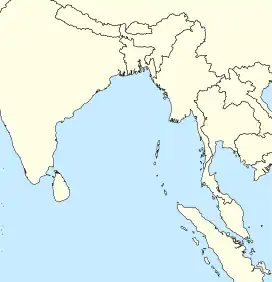| Sentinelese | |
|---|---|
| Native to | India |
| Region | North Sentinel Island, in the southwest of the Andaman and Nicobar Islands |
| Ethnicity | Perhaps 100–250 Sentinelese people (2007)[1][2] |
Native speakers | 250 (2018)[3] |
Unclassified (possibly Ongan) | |
| Language codes | |
| ISO 639-3 | std |
| Glottolog | sent1241 |
| ELP | Sentinel |
 North Sentinel Island, the small grey island to the southwest, shown in the context of the other Andamanese languages. | |
 Sentinelese Location in the Bay of Bengal | |
| Coordinates: 11°33′N 92°15′E / 11.55°N 92.25°E | |
Sentinelese is the undescribed language of the Sentinelese people of North Sentinel Island in the Andaman and Nicobar Islands, India. Given the lack of contact between the Sentinelese people and the rest of the world, essentially nothing is known of their language or its vitality.[4] The Sentinelese people do not allow outsiders onto the island and are generally hostile towards visitors.[5] Friendly interactions have been rare.[6]
Classification
It is presumed that the islanders speak a single language and that it is a member of one of the known Andamanese language families.[4] Based on what little is known about similarities in culture and technology and their geographical proximity, it is supposed that their language is related to the Ongan languages, such as Jarawa, rather than to Great Andamanese.[3] On the documented occasions when Onge-speaking individuals were taken to North Sentinel Island in order to attempt communication, they were unable to recognise any of the language spoken by the inhabitants.[7] It has been recorded that the Jarawa and Sentinelese languages are mutually unintelligible.[8]
Status
Sentinelese is classified as endangered because of the small number of speakers, matching the unknown population of the island, which has been estimated at anywhere from 100 to 250;[1][2] a rough estimate by the Government of India is 100.[9]
References
- 1 2 Brenzinger, Matthias (2007). Language diversity endangered. Walter de Gruyter. p. 40. ISBN 978-3-11-017049-8.
- 1 2 Moseley, Christopher (2007). Encyclopedia of the world's endangered languages. Routledge. pp. 289, 342. ISBN 978-0-7007-1197-0.
- 1 2 Sentinelese at Ethnologue (25th ed., 2022)

- 1 2 "The most isolated tribe in the world?". Survival International. Archived from the original on 2019-10-26. Retrieved 2009-10-07.
- ↑ Van Driem, G. (2007). "Endangered Languages of South Asia". Handbook of Endangered Languages. Berlin: Mouton de Gruyter. pp. 303–341.
- ↑ "When the Sentinelese shun bows and arrows to welcome outsiders". Economic Times. December 3, 2018.
- ↑ Pandya, Vishvajit (2008). In the Forest: Visual and Material Worlds of Andamanese History (1858–2006). University Press of America. p. 362. ISBN 978-0-7618-4153-1.
- ↑ Enumeration of Primitive Tribes in A&N Islands: A Challenge (PDF) (Report). Archived (PDF) from the original on 11 December 2014.
The first batch could identify 31 Sentinelese. The second batch could count altogether 39 Sentinelese consisting of male and female adults, children and infants. During both the contacts the enumeration team tried to communicate with them through some Jarawa words and gestures, but, Sentinelese could not understand those verbal words.
- ↑ Abbi, Anvita (2006). "Endangered Languages of the Andaman Islands". LINCOM Studies in Asian Linguistics. München: Lincom. 64.